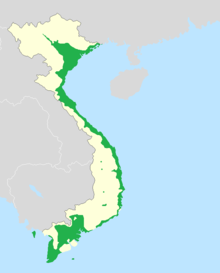Vietnamese language
| Vietnamese | |
|---|---|
| Tiếng Việt | |
| Pronunciation |
[tĭəŋ vìəˀt] (Northern) [tǐəŋ jìək] (Southern) |
| Native to | Vietnam, Guangxi (China) |
|
Native speakers
|
75 million (2007) |
|
Austroasiatic
|
|
|
Latin (Vietnamese alphabet) Vietnamese Braille Chữ nôm |
|
| Official status | |
|
Official language in
|
|
|
Recognised minority
language in |
|
| Language codes | |
| ISO 639-1 | vi |
| ISO 639-2 | |
| ISO 639-3 | |
| Glottolog | viet1252 |
| Linguasphere | 46-EBA |

Natively Vietnamese-speaking (non-minority) areas of Vietnam
|
|
Vietnamese ![]() i/ˌviɛtnəˈmiːz/ (Tiếng Việt) is an Austroasiatic language that originated in the north of modern-day Vietnam, where it is the national and official language. It is the native language of the Vietnamese (Kinh) people, as well as a first or second language for the many ethnic minorities of Vietnam. As the result of Vietnamese emigration and cultural influence, Vietnamese speakers are found throughout the world, notably in East and Southeast Asia, North America, Australia and Western Europe. Vietnamese has also been officially recognized as a minority language in the Czech Republic.
i/ˌviɛtnəˈmiːz/ (Tiếng Việt) is an Austroasiatic language that originated in the north of modern-day Vietnam, where it is the national and official language. It is the native language of the Vietnamese (Kinh) people, as well as a first or second language for the many ethnic minorities of Vietnam. As the result of Vietnamese emigration and cultural influence, Vietnamese speakers are found throughout the world, notably in East and Southeast Asia, North America, Australia and Western Europe. Vietnamese has also been officially recognized as a minority language in the Czech Republic.
It is part of the Austroasiatic language family of which it has by far the most speakers (several times as many as the other Austroasiatic languages combined). Vietnamese vocabulary has borrowings from Chinese, and it formerly used a modified set of Chinese characters called chữ nôm given vernacular pronunciation. The Vietnamese alphabet (quốc ngữ) in use today is a Latin alphabet with additional diacritics for tones and certain letters.
...
Wikipedia
